20 june 2018
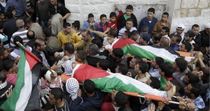
Israeli Supreme Court refused on Wednesday to return the bodies of three Palestinians who were killed by Israeli soldiers in West Bank over the past few months.
The court ruled that the State of Israel must submit all classified and intelligence documents relating to the Israeli government's decision to transfer the bodies of three slain Palestinians for burial.
The ruling came after the Goldin family, whose son Hadar was captured by Hamas Movement's armed wing during 2014's aggression on Gaza, requested the court intervene so that the government decision not to return the bodies be implemented.
The Goldins also requested that the dead Palestinians’ bodies only be released on condition that their funerals do not turn into mass events and media festivals.
The bodies in question are those of Muhammad Anbar, from Tulkarem, Mohamed Marshud, from Nablus, and Rami Sabrana from al-Khalil.
The court ruled that the State of Israel must submit all classified and intelligence documents relating to the Israeli government's decision to transfer the bodies of three slain Palestinians for burial.
The ruling came after the Goldin family, whose son Hadar was captured by Hamas Movement's armed wing during 2014's aggression on Gaza, requested the court intervene so that the government decision not to return the bodies be implemented.
The Goldins also requested that the dead Palestinians’ bodies only be released on condition that their funerals do not turn into mass events and media festivals.
The bodies in question are those of Muhammad Anbar, from Tulkarem, Mohamed Marshud, from Nablus, and Rami Sabrana from al-Khalil.
8 june 2018
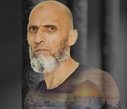
Hebrew media sources on Thursday reported that Israel's Minister of Public Security Gilad Erdan had requested that an order be issued to bury the body of the Palestinian martyr Aziz Oweisat, who died about two weeks ago, in the so-called "cemeteries of numbers".
Israel Hayom newspaper said that this request was submitted by Erdan to Israel's Minister of War Avigdor Lieberman.
This request came a few days after the Israeli authorities refused to hand over Oweisat's body to his family with the aim of putting more pressure on Hamas to reveal information about the Israeli soldiers captured in Gaza.
Oweisat's family had filed a petition to the Israeli Supreme Court demanding the return of their son's body.
Oweisat suffered severe bleeding and a heart attack after he was violently beaten by Israeli guards in Eshel prison on 2nd May.
Oweisat, a resident of Jabal al-Mukabber town south of Jerusalem, was arrested in 2014 and sentenced to 30 years in prison.
The Israeli occupation authorities still detain the bodies of 249 Palestinian martyrs in the cemeteries of numbers and 10 martyrs in mortuaries and refuse to hand them over to their families.
Cemeteries of numbers are closed military cemeteries where Israel holds the remains of some Palestinian and Arab martyrs killed by its forces. The graves are marked with numbers rather than names. Neither the martyrs' families nor human rights organizations are allowed access to these cemeteries.
Israel Hayom newspaper said that this request was submitted by Erdan to Israel's Minister of War Avigdor Lieberman.
This request came a few days after the Israeli authorities refused to hand over Oweisat's body to his family with the aim of putting more pressure on Hamas to reveal information about the Israeli soldiers captured in Gaza.
Oweisat's family had filed a petition to the Israeli Supreme Court demanding the return of their son's body.
Oweisat suffered severe bleeding and a heart attack after he was violently beaten by Israeli guards in Eshel prison on 2nd May.
Oweisat, a resident of Jabal al-Mukabber town south of Jerusalem, was arrested in 2014 and sentenced to 30 years in prison.
The Israeli occupation authorities still detain the bodies of 249 Palestinian martyrs in the cemeteries of numbers and 10 martyrs in mortuaries and refuse to hand them over to their families.
Cemeteries of numbers are closed military cemeteries where Israel holds the remains of some Palestinian and Arab martyrs killed by its forces. The graves are marked with numbers rather than names. Neither the martyrs' families nor human rights organizations are allowed access to these cemeteries.
6 june 2018
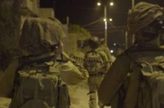
Israeli soldiers invaded, on Wednesday at dawn, Beit Ummar town, north of the southern West Bank city of Hebron, abducted two Palestinians, and injured several others, during protests the took place following the invasion.
Media sources in Hebron said the soldiers stormed and searched homes in Beit Ummar, before abducting former political prisoner, Saed Emad Sleibi, 22, and Mohsin Mohammad Za’aqeeq, 17.
They added that the soldiers fired rubber-coated steel bullets, gas bombs and concussion grenades at Palestinian protesters, causing many to suffer the effects of teargas inhalation.
In related news, the soldiers invaded homes of Palestinians from Sabarna family, and confiscated their work and entry permits into occupied Jerusalem, because they are related to Rami Sabarna, 36, the Palestinian worker who was killed by Israeli army fire in Hebron, on June 2nd.
It is worth mentioning that the Israeli army is still holding Sabarna’s body and refusing to transfer it to his family.
In addition, the soldiers invaded many homes of former political prisoners, in Hebron city, and violently searched them.
The invaded homes belong to Fawzi Khatib, Anas Zghayyar, Raed Ashour, Hashim Abu Turki, Abdullah Joneidi and Hazem Joneidi.
Media sources in Hebron said the soldiers stormed and searched homes in Beit Ummar, before abducting former political prisoner, Saed Emad Sleibi, 22, and Mohsin Mohammad Za’aqeeq, 17.
They added that the soldiers fired rubber-coated steel bullets, gas bombs and concussion grenades at Palestinian protesters, causing many to suffer the effects of teargas inhalation.
In related news, the soldiers invaded homes of Palestinians from Sabarna family, and confiscated their work and entry permits into occupied Jerusalem, because they are related to Rami Sabarna, 36, the Palestinian worker who was killed by Israeli army fire in Hebron, on June 2nd.
It is worth mentioning that the Israeli army is still holding Sabarna’s body and refusing to transfer it to his family.
In addition, the soldiers invaded many homes of former political prisoners, in Hebron city, and violently searched them.
The invaded homes belong to Fawzi Khatib, Anas Zghayyar, Raed Ashour, Hashim Abu Turki, Abdullah Joneidi and Hazem Joneidi.
5 june 2018
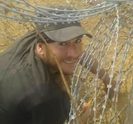
The International Red Cross have informed a Palestinian family from Khan Younis, in the southern part of the Gaza Strip, that their son is the young man who was shot and killed, Monday, by Israeli soldiers at the border fence, in southern Gaza.
The slain Palestinian has been identified as Ramzi Najjar, a relative and a neighbor of the Palestinian medic, Razan Najjar, 22, who was shot and killed by Israeli forces while helping treat wounded protesters, on Friday June 1st, 2018.
He was shot, on Monday afternoon, near the border fence, east of Khan Younis, in the southern part of the Gaza Strip, after cutting sections of the border fence. Other Palestinians, who were with Ramzi, managed to escape unharmed.
The Israeli army is holding his body and refusing to transfer it back to his family and claimed that the Palestinian “was carrying an axe to kill Israelis.”
His sister said that Ramzi was saddened and angered by the death of Razan, and that he was telling her about the great stuff Razan is doing, describing her as the angel of mercy, helping all the wounded, and her ongoing care, dedication, selfless giving and support to the injured Palestinians.
She added that her brother and friends were always present at the Return Camp, helping the people, bringing them water, and doing whatever we could to assist.
Dr. Ashraf al-Qedra, the spokesperson of the Health Ministry in Gaza, said in Twitter and Facebook posts that the soldiers have killed 123 Palestinians, including 13 children, and injured 13672 others, including hundreds of suffered serious wounds, mainly after being shot with expanding bullets, since March 30th.
He denounced the Israeli army’s use of sniper fire to kill and main the protesters, and for using gas bombs of unknown components that cause serious complications, impacting the neurological and the respiratory systems.
Dr. al-Qedra also said that, besides killing the two medics, the soldiers injured 223 others, and caused damage to 37 ambulances, in addition to targeting Palestinian journalists, killing two, identified as Yasser Mortaja and Ahmad Abu Hussein, in addition to wounding 144 others.
The slain Palestinian has been identified as Ramzi Najjar, a relative and a neighbor of the Palestinian medic, Razan Najjar, 22, who was shot and killed by Israeli forces while helping treat wounded protesters, on Friday June 1st, 2018.
He was shot, on Monday afternoon, near the border fence, east of Khan Younis, in the southern part of the Gaza Strip, after cutting sections of the border fence. Other Palestinians, who were with Ramzi, managed to escape unharmed.
The Israeli army is holding his body and refusing to transfer it back to his family and claimed that the Palestinian “was carrying an axe to kill Israelis.”
His sister said that Ramzi was saddened and angered by the death of Razan, and that he was telling her about the great stuff Razan is doing, describing her as the angel of mercy, helping all the wounded, and her ongoing care, dedication, selfless giving and support to the injured Palestinians.
She added that her brother and friends were always present at the Return Camp, helping the people, bringing them water, and doing whatever we could to assist.
Dr. Ashraf al-Qedra, the spokesperson of the Health Ministry in Gaza, said in Twitter and Facebook posts that the soldiers have killed 123 Palestinians, including 13 children, and injured 13672 others, including hundreds of suffered serious wounds, mainly after being shot with expanding bullets, since March 30th.
He denounced the Israeli army’s use of sniper fire to kill and main the protesters, and for using gas bombs of unknown components that cause serious complications, impacting the neurological and the respiratory systems.
Dr. al-Qedra also said that, besides killing the two medics, the soldiers injured 223 others, and caused damage to 37 ambulances, in addition to targeting Palestinian journalists, killing two, identified as Yasser Mortaja and Ahmad Abu Hussein, in addition to wounding 144 others.
4 june 2018
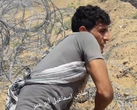
Ramzi Al-Najjar
A Palestinian young man was killed Monday afternoon near Gaza's eastern border fence after being shot by the Israeli occupation forces.
According to Hebrew sources, the Israeli army announced the death of a Palestinian youth who was shot and arrested while trying to breach the border fence east of Khan Younis, southern Gaza.
Palestinians in the Gaza Strip have been protesting since 30th March along the border with the 1948 occupied Palestinian territories to demand the right of return for refugees and call for lifting the blockade on the coastal enclave.
Over 120 Palestinian civilians have been killed by the Israeli army and about 13,000 injured since the protests started.
A Palestinian young man was killed Monday afternoon near Gaza's eastern border fence after being shot by the Israeli occupation forces.
According to Hebrew sources, the Israeli army announced the death of a Palestinian youth who was shot and arrested while trying to breach the border fence east of Khan Younis, southern Gaza.
Palestinians in the Gaza Strip have been protesting since 30th March along the border with the 1948 occupied Palestinian territories to demand the right of return for refugees and call for lifting the blockade on the coastal enclave.
Over 120 Palestinian civilians have been killed by the Israeli army and about 13,000 injured since the protests started.
1 june 2018

Following a petition at the Israeli high court, the Israeli government said it would notify relatives of an army soldier who is held by Hamas 72 hours ahead of returning any Palestinian bodies in order to receive their objection.
According to the court verdict, the government will inform the family of Hadar Goldin, an Israeli captive being held by Hamas in the Gaza Strip, before it returns the bodies of Palestinians to their families for burial, the state attorney’s office said Thursday.
The development came after the family of soldier Hadar Goldin petitioned the high court of justice Tuesday to prevent the authorities from giving up the body of Hamas-affiliated prisoner Aziz Owaisat for burial.
During the summer 2014 Gaza war, Hamas captured two Israeli soldiers, Goldin and Oron Shaul, who are claimed by Israel to have been killed in action.
Their families have accused the government of not doing enough to bring their loved ones home.
According to the court verdict, the government will inform the family of Hadar Goldin, an Israeli captive being held by Hamas in the Gaza Strip, before it returns the bodies of Palestinians to their families for burial, the state attorney’s office said Thursday.
The development came after the family of soldier Hadar Goldin petitioned the high court of justice Tuesday to prevent the authorities from giving up the body of Hamas-affiliated prisoner Aziz Owaisat for burial.
During the summer 2014 Gaza war, Hamas captured two Israeli soldiers, Goldin and Oron Shaul, who are claimed by Israel to have been killed in action.
Their families have accused the government of not doing enough to bring their loved ones home.
29 may 2018
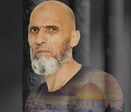
Israeli Internal Security Minister Gilad Erdan has decided against transferring the corpse of a Palestinian detainee, who was died from complications after Israeli soldiers assaulted him in prison, back to his family for burial.
The detainee Aziz ‘Oweisat, 53, died a week ago while receiving treatment at an Israeli medical center; he suffered serious complications after he was assaulted by several Israeli soldiers in the prison, who claimed he attacked an officer with a sharp object.
Aziz suffered brain hemorrhage and a heart attack after the soldiers continuously assaulted him in Eshil Israeli prison, on May 2, 2018, and went into a coma before he was moved to Ramla Israeli Medical Center.
Later, the detainee was moved to Assaf Harofeh Medical Center due to the seriousness of his condition, but he suffered further deterioration, and was transferred to Tal HaShomer Medical Center.
On May 10th, 2018, he underwent heart surgery at Tal HaShomer Israeli Medical Center, but remained in a critical condition until he passed away.
Israeli sources said the head of the Israeli Internal Security Agency, and the Prison Authority, opposed Erdan’s decision, because it could lead to large-scale protests, especially during Ramadan.
They fear that this decision would also lead to further complications in the efforts to retrieve the corpses of Israeli soldiers who are believed to be killed, and held by Hamas in Gaza, since the Israeli offensive in 2014.
However, Erdan said this decision will not cause to clashes and tension in Jerusalem, and aims at pressuring Hamas to release the corpse of Israeli soldiers, without holding prisoner swap agreements.
The final decision remains in the hands of Israeli Prime Minister Benjamin Netanyahu.
The detainee Aziz ‘Oweisat, 53, died a week ago while receiving treatment at an Israeli medical center; he suffered serious complications after he was assaulted by several Israeli soldiers in the prison, who claimed he attacked an officer with a sharp object.
Aziz suffered brain hemorrhage and a heart attack after the soldiers continuously assaulted him in Eshil Israeli prison, on May 2, 2018, and went into a coma before he was moved to Ramla Israeli Medical Center.
Later, the detainee was moved to Assaf Harofeh Medical Center due to the seriousness of his condition, but he suffered further deterioration, and was transferred to Tal HaShomer Medical Center.
On May 10th, 2018, he underwent heart surgery at Tal HaShomer Israeli Medical Center, but remained in a critical condition until he passed away.
Israeli sources said the head of the Israeli Internal Security Agency, and the Prison Authority, opposed Erdan’s decision, because it could lead to large-scale protests, especially during Ramadan.
They fear that this decision would also lead to further complications in the efforts to retrieve the corpses of Israeli soldiers who are believed to be killed, and held by Hamas in Gaza, since the Israeli offensive in 2014.
However, Erdan said this decision will not cause to clashes and tension in Jerusalem, and aims at pressuring Hamas to release the corpse of Israeli soldiers, without holding prisoner swap agreements.
The final decision remains in the hands of Israeli Prime Minister Benjamin Netanyahu.
25 may 2018
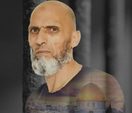
Palestinian Detainees and Ex-Detainees Affairs Commission on Saturday unveiled a testimony by prisoner Feras Omari who met with slain prisoner Aziz Oweisat in the Bosta, a vehicle used for the transfer of Palestinian prisoners, while he was being transferred from Eshel prison to Ramle clinic on 7th May.
Oweisat died a few days ago from a heart attack he suffered after being brutally beaten by Israeli prison guards.
Feras Omari said that when he entered the Bosta he saw blue bruises all over Oweisat's face, adding that when he asked him about what happened he told him that 10 Israeli guards broke into his cell in Eshel prison on 2nd May and beat and punched him brutally.
"I noticed that he was suffering from pains in his chest and he could barely breathe," Omari said.
Commenting on this testimony, head of the Detainees and Ex-Detainees Commission Issa Qaraqe said that the results of the autopsy conducted for Oweista's body on 25th May showed bruises on his right waist and marks of chains on his hands and feet.
Qaraqe said that the Israel Prison Service (IPS) committed three crimes against Oweisat. First, Oweisat was suffering from heart problems. He underwent an open-heart surgery in 1998 and a cardiac catheterization in 2003. Despite the fact that the IPS was aware of his health condition, no proper treatment was offered to him, so his health kept worsening day by day.
Second, the Israeli guards' attack on Oweisat led to further deterioration in his health until he died from a heart attack on 20th May.
Third, Oweisat was violently beaten and assaulted although the IPS and the prison doctors were fully aware of his critical health condition. They were the reason behind the complications that he suffered after the attack and later led to his death.
Qaraqe stressed that this is a deliberate and complex crime that is added to an endless series of violations committed by the IPS against Palestinian prisoners and requires the intervention of the International Criminal Court.
Oweisat died a few days ago from a heart attack he suffered after being brutally beaten by Israeli prison guards.
Feras Omari said that when he entered the Bosta he saw blue bruises all over Oweisat's face, adding that when he asked him about what happened he told him that 10 Israeli guards broke into his cell in Eshel prison on 2nd May and beat and punched him brutally.
"I noticed that he was suffering from pains in his chest and he could barely breathe," Omari said.
Commenting on this testimony, head of the Detainees and Ex-Detainees Commission Issa Qaraqe said that the results of the autopsy conducted for Oweista's body on 25th May showed bruises on his right waist and marks of chains on his hands and feet.
Qaraqe said that the Israel Prison Service (IPS) committed three crimes against Oweisat. First, Oweisat was suffering from heart problems. He underwent an open-heart surgery in 1998 and a cardiac catheterization in 2003. Despite the fact that the IPS was aware of his health condition, no proper treatment was offered to him, so his health kept worsening day by day.
Second, the Israeli guards' attack on Oweisat led to further deterioration in his health until he died from a heart attack on 20th May.
Third, Oweisat was violently beaten and assaulted although the IPS and the prison doctors were fully aware of his critical health condition. They were the reason behind the complications that he suffered after the attack and later led to his death.
Qaraqe stressed that this is a deliberate and complex crime that is added to an endless series of violations committed by the IPS against Palestinian prisoners and requires the intervention of the International Criminal Court.
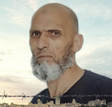
The preliminary report of the autopsy carried out to the body of Aziz Awaisat, a Palestinian detainee who died in Israeli prisons two days ago, revealed that a cute heart attack was behind his death, rights sources said.
The Detainees and Ex-detainees Affairs Commission reported that the autopsy was carried out in the Forensic Medicine Institute 'Abu Kabir' in the presence of Palestinian Forensic Dr. Rayyan Ali.
Dr. Ali said although a heart attack was the main cause for Awisat’s death, signs of bruises appeared on his body.
The commission quoted the testimonies of some Palestinian detainees in Eshel prison, where Awaisat had been held before his death, who said that Awaisat was exposed to a cruel assault by Israeli prison guards prior to his death.
According to the prisoners, Awaisat fell into a coma as a result of the attack and was moved to hospital, where his health deteriorated further before he was announced dead.
Awaisat, 53, was arrested by Israeli authorities on August 3, 2014 and was sentenced to 30 years in jail.
The Detainees and Ex-detainees Affairs Commission reported that the autopsy was carried out in the Forensic Medicine Institute 'Abu Kabir' in the presence of Palestinian Forensic Dr. Rayyan Ali.
Dr. Ali said although a heart attack was the main cause for Awisat’s death, signs of bruises appeared on his body.
The commission quoted the testimonies of some Palestinian detainees in Eshel prison, where Awaisat had been held before his death, who said that Awaisat was exposed to a cruel assault by Israeli prison guards prior to his death.
According to the prisoners, Awaisat fell into a coma as a result of the attack and was moved to hospital, where his health deteriorated further before he was announced dead.
Awaisat, 53, was arrested by Israeli authorities on August 3, 2014 and was sentenced to 30 years in jail.
23 may 2018
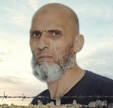
Israeli magistrate court in Rishon Lezion city in 1948 Occupied Palestine decided on Tuesday to conducting an external medical check for the body of martyr Aziz Oweista, 53, who died in Israeli jails to figure out the reasons behind his death.
The director of the legal unit at Detainees and Ex-Detainees Commission, Iyad Misk, said that the court will consider the results of the external check up and if the reasons are still not known, they will do an autopsy.
The court’s decision provided that a Palestinian physician will attend the autopsy operation in case there is a need for that, following a new court decision.
Oweisat, a resident of Jabal al-Mukaber town south of Jerusalem, was arrested in 2014 and sentenced to 30 years in prison.
Oweisat had suffered severe bleeding and a heart attack after being violently beaten by Israeli prison guards in Eshel prison on 2nd May.
The director of the legal unit at Detainees and Ex-Detainees Commission, Iyad Misk, said that the court will consider the results of the external check up and if the reasons are still not known, they will do an autopsy.
The court’s decision provided that a Palestinian physician will attend the autopsy operation in case there is a need for that, following a new court decision.
Oweisat, a resident of Jabal al-Mukaber town south of Jerusalem, was arrested in 2014 and sentenced to 30 years in prison.
Oweisat had suffered severe bleeding and a heart attack after being violently beaten by Israeli prison guards in Eshel prison on 2nd May.
